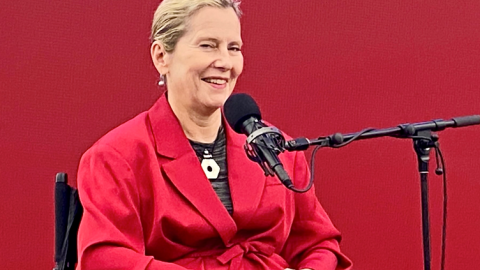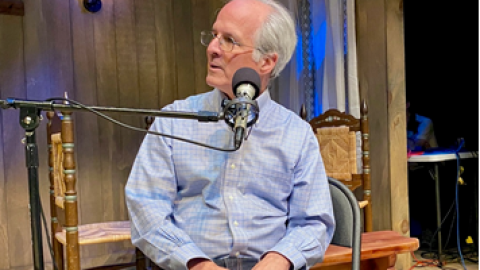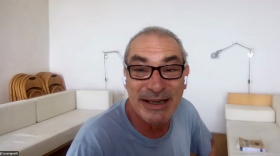-
This week’s show features Paola Antonelli, Curator of Architecture and Design at MoMA, who says she prefers “small provocations”—the kind that sneak up on you rather than hit you over the head. Presented with the Viñoly Foundation, the episode’s inspirations include Prince as the person, Fiorucci on Via Torino in Milan as the place, the Boeing 747 as the thing, chickpeas as Randy’s thing, and music by Ethel.
-
The heirs of deceased playwrights can be finicky about new productions—Samuel Beckett, Arthur Miller—but Jonathan Bank, the head of the Mint Theater, has a different experience. “What I tend to run into from estates is, Really? You’re interested in that old play? Great!” How to revive neglected plays. Music: Sean Hagerty.
-
Set and costume designer Santo Loquasto has worked on 80 Broadway shows, 30 films, several operas, and innumerable dance pieces. Here’s something he learned working with Paul Taylor: “Give a man 17 chairs and see what he comes up with.”
-
Architects Jessie Reiser and Nanako Umemoto, recipients of The National Academy of Design award, admit they once avoided their alma mater, Cooper Union, for years—“we would detour three or four blocks or else the PTSD would kick in.” They recall their time there as something out of The Paper Chase or Whiplash—but with less compassion. This episode also features Dogen, a 3-D printed object, and Randy’s Creatures: wolves in Greek mythology, with music by Karl Schwartz.
-
Preservationist Anthony Wood, a wily veteran of decades of urban campaigns, is happy in his work: “I’ve never regretted being involved in saving a landmark. I’ve only regretted the ones I couldn’t save.” Presented with the New York Preservation Archive Project.
-
Playwright Will Power’s grandfather faced a tough decision, “He went to seek the advice of Paul Robeson.” Power also tells us about the Upper Room and Mountain Valley Spring Water. Presented with the Classical Theatre of Harlem.
-
Nilka Martell and her neighbors—untrained, uncredentialed—revived the Bronx River and are taking on the hideous Cross Bronx Expressway. “We’re just a group of Bronxites that have these ambitious ideas, and we’re just going to figure it out.” Presented with the Architectural League, in conjunction with the exhibition Cross Bronx/Living Legend at the Bronx River Art Center.
-
Luca Vignelli reflects on his parents, Massimo and Lella Vignelli—legendary designers who created everything from furniture to typefaces, including the bold 1972 New York City subway map. Though initially hated and quickly withdrawn, the MTA has now revived the map, slightly revised, offering rare good news in tough times. “It was a diagram, not a map,” Luca explains. Speaking from Nerano, Italy, he shares insights into their legacy, their philosophy, and why they never saw themselves as artists.
-
Steve Clay and M.C. Kinniburgh are the curators of the Grolier Club exhibition After Words: Visual and Experimental Poetry in Little Magazines and Small Presses, 1960-2025. They assert, “The least interesting thing about a book is its contents.” Clay and Kinniburgh also tell about a Michael McClure poster and a Johanna Drucker book.
-
Janis Siegel, a member of Manhattan Transfer, has won ten Grammy Awards, but “I was not going to be a singer at all, actually; I was going to be a nurse.” Medicine’s loss, music’s gain. Siegel tells us about Pips Comedy Club and Tim Hauser.
-
Jamie Bernstein’s father, Leonard Bernstein, almost thought “that if he could write a good enough song, maybe he could stop war.” Not mad, aspiring. “It’s ridiculously idealistic, but that was his impetus.” Tales of a famous father. Bernstein tells us all about her father’s music!
-
Actor Charles Busch says, “My life was a bit like the plot of Auntie Mame.” Busch has stories about Linda Lavin, Christopher Isherwood, Lily Tomlin, Angela Landsbury, Vivien Leigh, Marlene Dietrich, and tells us about Gritti Palace, Venice. Plus, he sings.
















